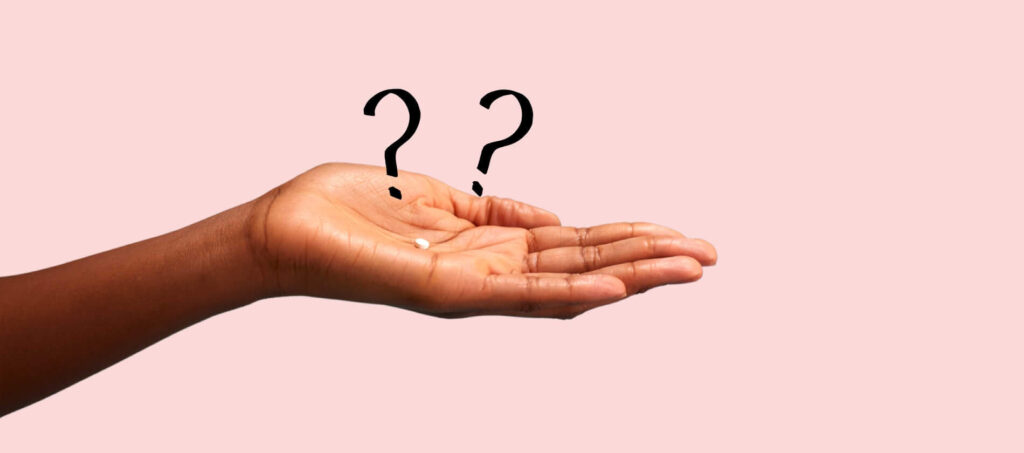6 Medications You Shouldn’t Take With the Birth Control Pill

Medically reviewed by Dr. Betty Acker, MD on January 30, 2025
The birth control pills are a very popular form of contraception. We write hundreds of thousands of prescriptions for our patients every year. Pills are affordable, easy to tolerate, and there are so many different options to choose from. We can work with you to find the right fit and we are usually very successful in preventing pregnancy as well as treating lots of other issues like acne, hair growth, heavy periods, and irregular periods, just to name a few.
With so many people using birth control pills every day, it is quite common to wonder about potential interactions with other medications. Here is an overview of some of the things to think about when wondering if it is safe to take both a birth control pill and your other medications or supplements.
1. Antibiotics
Historically, antibiotics were thought to decrease the effectiveness of birth control pills, and this may be why a provider told you this at some point. But, studies have shown that most do not. So if you use antibiotics (like Minocycline and Clindamycin) for a tooth infection, a sinus infection, or for acne, you are most likely still very well protected. Remember: the effectiveness of pills depends completely on the person taking them. So if you are sick in bed and forget to take your pill, or you are throwing it up, that is a different situation altogether.
Birth control from Nurx costs as little as $0 with insurance or $15 per month without insurance.
On the other hand, there are a few less commonly used antibiotics that are known to decrease the effectiveness of birth control pills. RIFAMPIN is used for severe infections like meningitis or tuberculosis. It is known to make birth control pills less effective. In this unusual situation your doctor should tell you to use a backup method of contraception.
2. Diabetes medications
There are numerous medications that can affect your blood glucose levels. Both estrogen and progesterone are on this very long list. Because these hormone ingredients can affect your glucose levels, initiating birth control pills after you are already using a diabetes medication means that you must monitor your sugar levels more closely to see if you are affected. If you are already taking a medicine for diabetes, you may have to adjust your dose of that medicine and you’ll want to know as soon as possible.
3. Anti-Seizure medications
This is a pretty complicated issue because these medications are used not only to prevent seizures, but they are also widely and often used to prevent migraine headaches and for mood disorders, as mood stabilizers. They are in a different class of medications from antidepressants. Additionally, it matters whether your birth control pill is the traditional combination of estrogen and progesterone, or a progesterone-only pill. Not only does the specific indication matter, why you are using the medication, but also the specific dose you are using. Some of these medications cause the enzymes in your body to break down your birth control pill faster so that it becomes less effective. But sometimes your birth control can cause your antiseizure medicine to be broken down faster and thus become less effective. We must know why you are using the medication, what specific medication it is that you are using, and what your dose is in order to best know whether your specific combination is safe. This means safe to both prevent pregnancy adequately and safe to treat the medical condition for which it is being used.
4. HIV treatments
Certain categories of the antiviral medications used to treat HIV can affect how well your birth control pill works. Specifically, there is a group of medications classified as Protease Inhibitors. These medications directly affect how your body uses the estrogen in your pill. However, these medications do not seem to affect progesterone so if your pill does not contain estrogen it is not affected. Integrase Inhibitors are another antiviral class of medications used to treat HIV. This category of medication does not interact with your birth control pill.
5. St. John’s Wort
Herbs and supplements are very popular but there is little information on the specific interactions between them and birth control pills. St. John’s Wort is one that is known to decrease the levels of active hormones in your body. Because of this effect people who use this combination are encouraged to use additional contraceptive measures to ensure that this effect on hormones does not result in a failure to prevent pregnancy.
6. Bile Acid Sequestrants
This is a category of medication used to treat high cholesterol and other conditions like reflux. The medication interacts with the estrogen in pills and lowers it to a less effective level. Luckily the data shows that as long as the 2 medications are taken more than 4 hours apart, the effect is minimal.
What About Antidepressants?
Many people use antidepressant medications on a daily basis. The combination of antidepressants and birth control pills is very common and there is no data to show that antidepressants lessen the effectiveness of your birth control or that birth control pills lessen the effectiveness of your antidepressant. In addition, studies show that birth control pills have minimal effect on mood. That is good in that they don’t worsen mood disorders but the reverse is also true: Birth control pills should not be used to treat mood disorders. If you take both antidepressants and birth control, be sure your medical provider knows in case they have any concerns about your specific mix of medications.





